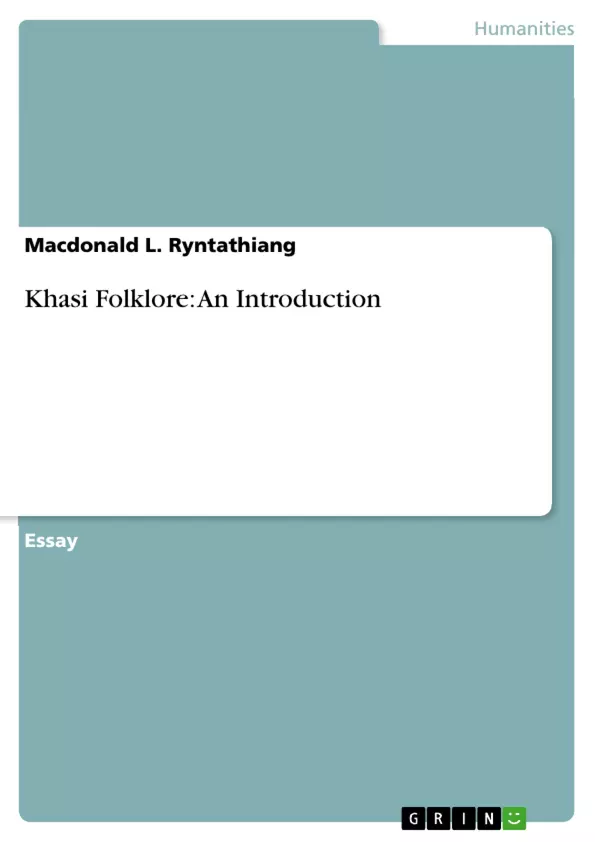Folklore is a term coined by William John Thoms in the periodical ‘The Athenaeum’ in 1846 as he find the two terms commonly used in England ‘Popular Antiquities’ and ‘Popular Literature’ to be inappropriate. In proposing the word folklore, Thoms gave a collective name to “the manners, customs, observances, superstitions, ballads, proverbs, etc of the “olden time” and provided a linguistic basis for subsequently designating a distinctive field of study (folkloristics) and those who made the lore of the people” the focal point of their inquiries (folklorists). John Roberts is noteworthy to mention as he has produce some of his work by successfully adapted the Khasi third reader a few lessons of the Aesop’s fables. U Jeebon Roy, U Rabon Singh and U Sib Charan Roy jaid Dkhar is a few earlier writers that have tried in their own way to instill the people the importance of folklore.
Inhaltsverzeichnis (Table of Contents)
- Khasi Folklore
- Folklore as an academic discipline
- Khasi Folklore
- Folklore as a discipline
Zielsetzung und Themenschwerpunkte (Objectives and Key Themes)
This text explores the importance of folklore in the Khasi community and the need for its preservation. It aims to highlight the rich tradition of oral narratives and cultural practices that have shaped the Khasi identity. The text emphasizes the role of folklore as an academic discipline, discussing its potential for historical, cultural, and educational insights. Key themes include:- The origins and significance of folklore in the Khasi community.
- The role of folklore in preserving cultural identity and transmitting traditions.
- The academic study of folklore, its methodologies, and its potential for enriching our understanding of the Khasi culture.
- The challenges faced by Khasi folklore in the contemporary world.
- The need for continued research and preservation efforts to ensure the survival of Khasi folklore.
Zusammenfassung der Kapitel (Chapter Summaries)
This text begins by introducing the concept of folklore and its origins, tracing its evolution from a term coined by William John Thoms in 1846 to its recognition as a distinct field of study. It explores the four functions of folklore as outlined by William Bascom, highlighting its role in providing escapism, validating culture, serving as a pedagogic device, and maintaining conformity to social norms. The text then discusses early pioneers in folklore collection, including individuals like Thomas Crofton Croker, John Watson Fanning, and Elias Lönnrot, who contributed significantly to the field. The text also explores the significance of the Grimm brothers' collection of fairy tales and its lasting impact. The text then focuses on Khasi folklore, acknowledging the lack of systematic documentation and analysis of this rich cultural heritage. It discusses the challenges faced by Khasi folklore in a world influenced by Western ideals and the need to preserve and promote its unique traditions. The text highlights the contributions of individuals who have worked to document and study Khasi folklore, including Jeebon Roy, Rabon Singh, Sib Charan Roy, and Dr H. Lyngdoh. The text concludes by discussing the importance of folklore as an academic discipline and its relevance to the preservation of cultural identity. It emphasizes the need for continued research and analysis of Khasi folklore, highlighting the potential for enriching our understanding of the Khasi culture and its unique traditions.Schlüsselwörter (Keywords)
The text centers on the study of Khasi folklore, exploring its cultural significance, historical context, and its potential for academic exploration. Key terms and concepts that emerge include: oral narratives, cultural traditions, cultural identity, academic discipline, folklore methodologies, cultural preservation, and the influence of Western culture on Khasi folklore.Frequently Asked Questions
What is the origin of the term "folklore"?
The term "folklore" was coined by William John Thoms in 1846. He proposed it as a collective name for the manners, customs, observances, superstitions, and ballads of the "olden time," replacing less appropriate terms like "Popular Antiquities."
Why is folklore significant to the Khasi community?
Folklore is vital for preserving Khasi cultural identity and transmitting traditions across generations. It encompasses oral narratives and practices that define the community's unique heritage in the face of modern influences.
What are the four functions of folklore according to William Bascom?
William Bascom outlined four functions: providing escapism from reality, validating culture (explaining why things are done), serving as a pedagogic device for education, and maintaining conformity to social norms and pressure.
Who were the pioneers in documenting Khasi folklore?
Early writers and collectors who worked to instill the importance of Khasi folklore include U Jeebon Roy, U Rabon Singh, U Sib Charan Roy, and Dr. H. Lyngdoh. They focused on recording oral traditions before they were lost.
What challenges does Khasi folklore face today?
Khasi folklore faces challenges from the rapid spread of Western ideals and the lack of systematic documentation. There is an urgent need for continued research and preservation efforts to ensure these traditions survive in the contemporary world.
- Quote paper
- Macdonald L. Ryntathiang (Author), 2010, Khasi Folklore: An Introduction, Munich, GRIN Verlag, https://www.hausarbeiten.de/document/214038


